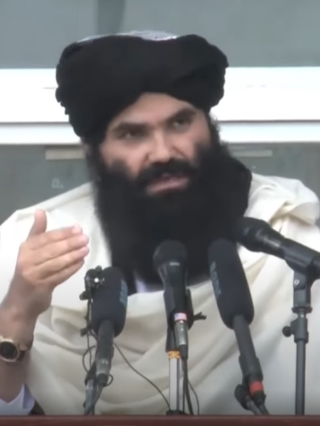
The Revolutionary Association of the Women of Afghanistan (RAWA) is a women's organization based in Kabul, Afghanistan, that promotes women's rights and secular democracy. It was founded in 1977 by Meena Keshwar Kamal, an Afghan student activist who was assassinated in February 1987 for her political activities. The group, which supports non-violent strategies, had its initial office in Kabul, Afghanistan, but then moved to Pakistan in the early 1980s.

Gulbuddin Hekmatyar is an Afghan politician, and former mujahideen leader and drug trafficker. He is the founder and current leader of the Hezb-e-Islami Gulbuddin political party, so called after Mohammad Yunus Khalis split from Hezbi Islami in 1979 to found Hezb-i Islami Khalis. He twice served as prime minister during the 1990s.

The Northern Alliance, officially known as the United Islamic National Front for the Salvation of Afghanistan, was a military alliance of groups that operated between early 1992 and 2001 following the dissolution of the Soviet Union. At that time, many non-Pashtun Northerners originally with the Republic of Afghanistan led by Mohammad Najibullah became disaffected with Pashtun Khalqist Afghan Army officers holding control over non-Pashtun militias in the North. Defectors such as Rashid Dostum and Abdul Momim allied with Ahmad Shah Massoud and Ali Mazari forming the Northern Alliance. The alliance's capture of Mazar-i-Sharif and more importantly the supplies kept there crippled the Afghan military and began the end of Najibullah's government. Following the collapse of Najibullah's government the Alliance would fall with a Second Civil War breaking out however following the Islamic Emirate of Afghanistan's (Taliban) takeover of Kabul, The United Front was reassembled.

Afghan refugees are citizens of Afghanistan who were forced to flee from their country as a result the continuous wars that the country has suffered since the Afghan-Soviet war, the Afghan civil war, the Afghanistan war (2001–2021) or either political or religious persecution. The 1978 Saur Revolution, followed by the 1979 Soviet invasion, marked the first major wave of internal displacement and international migration to neighboring Iran and Pakistan; smaller numbers also went to India or to countries of the former Soviet Union. Between 1979 and 1992, more than 20% of Afghanistan's population fled the country as refugees. Following the Soviet withdrawal in 1989, many returned to Afghanistan, however many Afghans were again forced to flee during the civil war in the 90s. Over 6 million Afghan refugees were residing in Iran and Pakistan by 2000. Most refugees returned to Afghanistan following the 2001 United States invasion and overthrow of the Taliban regime. Between 2002 and 2012, 5.7 million refugees returned to Afghanistan, increasing the country's population by 25%.

Sirajuddin Haqqani is an Afghan warlord and Specially Designated Global Terrorist who is the first deputy leader of Afghanistan and the acting interior minister in the internationally unrecognized post-2021 Taliban regime. He has been a deputy leader of the Taliban since 2015, and was additionally appointed to his ministerial role after the Taliban's victory over Western-backed forces in the 2001–2021 war. He has led the Haqqani network, a semi-autonomous paramilitary arm of the Taliban, since inheriting it from his father in 2018, and has primarily had military responsibilities within the Taliban.
Kidnapping and hostage taking has become a common occurrence in Afghanistan following the U.S. invasion of Afghanistan in 2001. Kidnappers include Taliban and Al-Qaeda fighters and common criminal elements.

The term Afghan conflict refers to the series of events that have kept Afghanistan in a near-continuous state of armed conflict since the 1970s. Early instability followed the collapse of the Kingdom of Afghanistan in the largely non-violent 1973 coup d'état, which deposed Afghan monarch Mohammad Zahir Shah in absentia, ending his 40-year-long reign. With the concurrent establishment of the Republic of Afghanistan, headed by Mohammad Daoud Khan, the country's relatively peaceful and stable period in modern history came to an end. However, all-out fighting did not erupt until after 1978, when the Saur Revolution violently overthrew Khan's government and established the Democratic Republic of Afghanistan. Subsequent unrest over the radical reforms that were being pushed by the then-ruling People's Democratic Party of Afghanistan (PDPA) led to unprecedented violence, prompting a large-scale pro-PDPA military intervention by the Soviet Union in 1979. In the ensuing Soviet–Afghan War, the anti-Soviet Afghan mujahideen received extensive support from Pakistan, the United States, and Saudi Arabia in a joint covert effort that was dubbed Operation Cyclone.
2003 in Afghanistan. A list of notable incidents in Afghanistan during 2003

Tolo News, stylized TOLOnews, is an Afghan news channel and website broadcasting from Kabul. Owned by the Moby Media Group, it was launched in August 2010 as Afghanistan's first twenty-four hour news channel.
The following lists events from 2014 in Afghanistan.

Peace processes have taken place during several phases of the Afghanistan conflict, which has lasted since the 1978 Saur Revolution.
Events in the year 2020 in Afghanistan.
Mark Randall Frerichs is an American civil engineer and former US Navy diver who disappeared in Afghanistan in January 2020 and was later confirmed to be captured by the Haqqani network, a group closely aligned with the Taliban. In September 2022, Frerichs was released by the Taliban-led government of the Islamic Emirate of Afghanistan in exchange for Bashir Noorzai.
The People's Peace Movement or Helmand Peace Convoy is a nonviolent resistance grassroots group in Afghanistan, created in March 2018 after a suicide car bomb attack on 19 March in Lashkargah, Helmand Province. The PPM calls for the military forces of both the government of Afghanistan and the Taliban to implement a ceasefire and advance the Afghan peace process. The group marched across Afghanistan to Kabul, where it met leaders of both parties and conducted sit-ins in front of diplomatic posts, before continuing its march to Balkh and Mazar-i-Sharif, arriving in September 2018.

The 2021 Taliban offensive was a military offensive by the Taliban insurgent group and allied militants that led to the fall of the Kabul-based Islamic Republic of Afghanistan and the end of the nearly 20-year War in Afghanistan that had begun following the United States invasion of the country. The Taliban victory had widespread domestic and international ramifications regarding human rights and proliferation of terrorism. The offensive included a continuation of the bottom-up succession of negotiated or paid surrenders to the Taliban from the village level upwards that started following the February 2020 US–Taliban deal.

On 15 August 2021, Afghanistan's capital city of Kabul was captured by the Taliban after a major insurgent offensive that began in May 2021. It was the final action of the War in Afghanistan, and marked a total victory for the Taliban. This led to the overthrowing of the Islamic Republic of Afghanistan under President Ashraf Ghani and the reinstatement of the Islamic Emirate of Afghanistan under the control of the Taliban.
On 15 August 2021, the city of Kabul, the capital of the Islamic Republic of Afghanistan, was captured by Taliban forces during the 2021 Taliban offensive, concluding the War in Afghanistan that began in 2001. The fall of Kabul provoked a range of reactions across the globe, including debates on whether to recognize the Taliban as the government of Afghanistan, on the humanitarian situation in the country, on the outcome of the War, and the role of military interventionism in world affairs.

Large-scale evacuations of foreign citizens and some vulnerable Afghan citizens took place amid the withdrawal of US and NATO forces at the end of the 2001–2021 war in Afghanistan. The Taliban took control of Kabul and declared victory on 15 August 2021, and the NATO-backed Islamic Republic of Afghanistan collapsed. With the Taliban controlling the whole city except Hamid Karzai International Airport, hostilities ceased and the Taliban assisted in the evacuation effort by providing security and screening evacuees.
The 20-year-long War in Afghanistan had a number of significant impacts on Afghan society.











